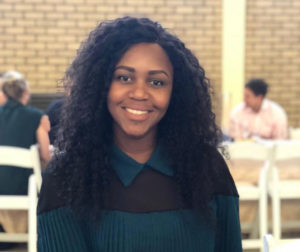 Growing up, Dr Zamavezi Kweyama was always passionate about people and human interaction in general. Zamavezi enjoyed the feeling that came with being able to help someone and so she directed that passion into medicine. She did not specifically choose to work in a district hospital but believes that the district hospital setting chose her.
Growing up, Dr Zamavezi Kweyama was always passionate about people and human interaction in general. Zamavezi enjoyed the feeling that came with being able to help someone and so she directed that passion into medicine. She did not specifically choose to work in a district hospital but believes that the district hospital setting chose her.
There is a great demand for healthcare services in small communities, which is not just limited to treatment, but also an intentional educational and awareness endeavour which Dr Kweyama is glad to be part of. Zamavezi describes herself as a being hard working, kindhearted, determined and driven to be the best in everything she associates with.
How do you describe your career path?
I am only still at the beginning, having only just completed my internship at Chris Hani Baragwanath Hospital. Now, I am about to complete my community service training at Embhuleni Hospital in rural Mpumalanga. There is still a lot I must do and grow in, with respect to my career, but I am excited with my development and all the steps I will take going forth. Upwards and onwards from here.
What does a typical day at work look like for you?
Currently, I am placed in the Outpatient Department in the hospital. Roughly, in a day, we see about 50+ patients who come from many different backgrounds and circumstances, with different psychosocial influences, majority rural. So, we just try to marry that with their treatment.
You have worked for a number of organisations, have you ever faced challenges due to your gender?
Not necessarily, from my experience, being professional matters a lot. Given the historical challenges women faced, especially in faculties such as medicine, and now being an active participant has somewhat given me a feeling that being an African woman garners me with a lot of respect from my colleagues and immediate community. People take pride in knowing that I love what I do, so more than anything, they have been inspired to encourage fellow females to do the same thing.
What experience are you most proud of?
I am proud of having worked for a district hospital. There are a lot of challenges here and my experience in this environment has taught me to trust myself and always endeavour to be a better doctor for the people I am seeing and treating. I have also learnt to be independent and to believe in myself and my skills.
What is your greatest regret?
I cannot think of any right now, I have always viewed challenges resulting in my decision making as lessons which I always learn from.
What, in your opinion, are the biggest opportunities for women in health on the African continent?
With the cultural background we come from, women have demonstrated that they too can do everything which was previously set aside for men only, especially in the medical field. We must continue to work hard to ensure that other women realize this, and from there the opportunities are endless.
Have you ever been mentored, if so by whom?
We had a lot of seniors who guided us during our internship. Their guidance was not only through teaching us how to manage patients, but how to go about deciding on a career path, not make the same mistakes they made and to always know that you have someone who supports you. I would not have called it a mentorship then but now, on hindsight, I realize that it went on unknowingly. We also had mentorship programs in my high school which really shaped me as a young female, who at the time did not know what her true potential in life was. It really built me and gave me the confidence to pursue a career in medicine. My mother has always been my mentor. There is no big decision that I take without my mother’s advice and I am grateful to have her continuous mentoring.
What is the value of mentorship in your opinion?
Mentorship is very important in that as a career woman, you can get so lost in your career that you don’t realize your potential. And having someone there to help guide you can open you up to realizing who you are or what you can do. It also helps to speak to someone who knows what you are going through and what more you can do to build your career.
What is the best advice you ever received?
If you believe it, you can achieve it. I had so many hurdles to finally becoming a doctor. But once I finally got into medical school, nothing could stop me.

Leave a Reply